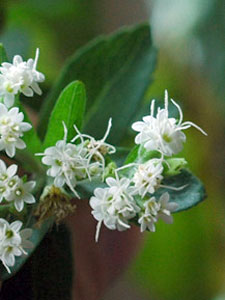Between the Leaves: Stevia Rebaudiana
I'm a new tea convert, and I take it with plenty of sugar. But with the holidays approaching, I'd like to scale back on the white stuff without giving up tea. Are there any non-artificial sweeteners out there?
It's that time of year when the world falls in love... with cookies. It's a universal weakness, the holiday cookie, and only the most militant of people make it through Thanksgiving and Christmas without a little indulgence. But, as you realize, even that isn't quite so bad if we give up an every-day sweetand sugary drinks make an excellent sacrificial lamb.

If your sugar water of choice happens to be sweet tea, you could always just try it without the sugar. In fact, many whole-leaf varieties are sweet on their own; particularly the oolongs, and even notoriously bitter blacks can be made a little sweeter just by brewing them at lower temperatures. But if you absolutely must have the syrupy-sweet taste, you will have to call in the reinforcements. Unfortunately, most natural sweeteners also have calories. Popular sugar alternatives like agave nectar, brown rice syrup, evaporated fruit juices, and honey all get their sweet properties from either sucrose (table sugar) itself or its basic components: glucose and fructose. These alternatives may give you some additional health properties you couldn't get from regular sugar, but none of them will help prevent holiday poundage. There is, however one natural option that will keep you from reaching for the blue, pink, and yellow packets: stevia.
Sweetener stevia primarily comes from Stevia rebaudiana Bertoni, a shrubby, South American plant that is one of a large genus that produces many compounds from one molecular frame called steviol. Two of these compounds, stevioside and rebaudioside A, incorporate glucose molecules with the steviol, which creates a sweet-tasting, but metabolically inert molecule. This means that you get a natural, sugar-like taste but no extra inches. Of course, something that sounds so good comes with its fair share of controversy. In 1985, a paper published by J.M. Pezzuto and his crew stated that steviolthat basic building blockhad mutagenic properties. Others have refuted this finding in many subsequent publications, culminating with the World Health Organization's 2006 statement that any mutagenic behavior observed in amplified laboratory conditions are not observed in live organisms. However, stevia's use in food currently remains banned in the European Union, Singapore, and Hong Kong. In the United States, stevia has been banned as a food additive since 1991, but was cleared in 1995 for sale as a dietary supplement. It must be noted that South Americans have used stevia for years-in some cases centuries-without incidence, as have the Japanese who have commercially produced it since the 1970s and who even use it to sweeten their Coca-Cola products.
Stevia can be found in many health food stores across the US in a variety of forms-from liquid drops to 'sugar' packets. You can even purchase whole leaf stevia online and steep it along with your tea. Some forms and brands may have a slight liquorice-like aftertaste, especially when a lot of the product is used; however, many people report that this aftertaste is greatly reduced in Paraguayan stevia. Of course, any form will let you indulge in all your favorite holiday treats with a little less guilt-and that's a great gift indeed.
Yours in Tea,
Christine/xine
